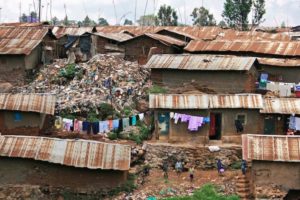By: Joy Odor/Kaduna
Globally, nearly 1 billion people live in slums, and this number is projected to double to 2 billion in the next 30 years.
In Sub-Saharan Africa, 71.8% of urban dwellers live in slums, the highest proportion in the world.
African slum and ghetto dwellers are said to be particularly vulnerable to the negative health effects of rapid urbanization, global climate change and the threat of common diseases in the area.
According to a report released Monday by the United Nations Human Settlements Programme (UNHABITAT), defines a slum as an urban area with a lack of basic services such as sanitation, potable water, electricity, substandard housing, overcrowding, unhealthy and hazardous locations, insecure tenure and social exclusion.
They said climate change is already having an extraordinary impact on human health worldwide affecting the spread of infectious diseases, exposing millions to air pollution, heat waves and dramatically reducing labor productivity.
The experts informed that climate change makes many existing diseases and conditions worse, but it may also help introduce new pests and pathogens into new regions or communities.
They mentioned that the most vulnerable people are children, the elderly, the poor and those with underlying health conditions are at increased risk for health effects from climate change.
Also another report by the British Medical Journal, “The Lancet” opined that urban outdoor pollution in Africa is responsible for an estimated 49 000 premature deaths annually.
According to Lancet, slums are often located near factories and busy roadways thus rendering their inhabitants vulnerable to a high burden of respiratory disease.
“Exposure to elevated concentrations of ozone is associated with increased hospital admissions for pneumonia, chronic obstructive pulmonary disease, asthma as well as with premature mortality.
“Warming is exacerbating the spread of Dengue fever, the world’s most rapidly expanding disease. In fact, two types of mosquitoes’ ability to spread Dengue globally have increased by 9.4% and 11.1% since the 1950s” they said.
“Cutting the greenhouse gas emissions that lead to global warming is necessary for public health, the report says.
“Reductions have already begun to occur across major economies, driven by the expansion of renewable energy and the phasing out of coal.
“Curbing emissions could have immediate and substantial health benefits, the report says, such as cleaner air in previously polluted cities.
“Preventing illnesses and injuries is more humane, more effective and more economical than treating people once they’ve become sick” Lancet stressed.
Sub-Saharan Africa is the least urbanized region in the world and only 39.1% of the region’s population lives in cities.
However, the region’s urban population is projected to more than double to 760 million by 2030 as the rate of urbanization makes it very challenging to manage.

















